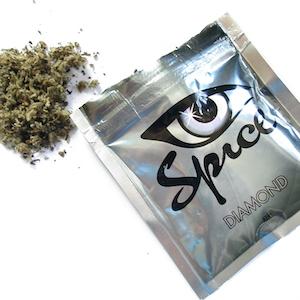"Synthetic marijuana" or "synthetic cannabinoids" are the worst possible names for these types of drugs. The reason is because their effects on the body are nothing like marijuana or cannabis, which is why we should change the name to something else.
Originally designed by scientists to study the nervous system, these drugs have made their way into the black market for recreational use. However, there are far better ways to spend one's recreational time. As we wrote previously:
According to the CDC, a person who consumes fake pot could experience "rapid heart rate, vomiting, agitation, confusion, and hallucinations." Two years ago, a synthetic cannabinoid that was 85 times more potent than tetrahydrocannabinol (THC, the active ingredient in marijuana) caused a "zombie outbreak" in New York City. Users were staring blankly and groaning, and 18 of 33 people were taken to the hospital.
Recently, in Illinois, four people bled to death after using synthetic cannabinoids (a.k.a., K2 or spice). How is that even possible?
How Synthetic Marijuana Can Make You Bleed to Death
 Just like any street drug, it's difficult for users to know what's been mixed in with the drug they think they are buying. In this case, the synthetic cannabinoid was mixed with brodifacoum, a rat poison. Brodifacoum is a type of drug known as a superwarfarin, and it is used to prevent blood from clotting. It does this by attacking the body's vitamin K metabolic pathway, which feeds directly into the blood clotting pathway. (See figure. Credit: The Lancet.)
Just like any street drug, it's difficult for users to know what's been mixed in with the drug they think they are buying. In this case, the synthetic cannabinoid was mixed with brodifacoum, a rat poison. Brodifacoum is a type of drug known as a superwarfarin, and it is used to prevent blood from clotting. It does this by attacking the body's vitamin K metabolic pathway, which feeds directly into the blood clotting pathway. (See figure. Credit: The Lancet.)
The important part of the figure is on the left, which depicts the ability of (super)warfarin to block the vitamin K cycle1. Ultimately, this prevents the body from manufacturing crucial blood clotting proteins known as factors II, VII, IX, and X2. Without these blood clotting proteins, people can bleed to death.
According to the most recent CDC report, synthetic cannabinoids caused 155 people to bleed, most of whom urinated blood. Four people suffered from massive bleeding and died.
The CDC writes that "the reason why brodifacoum [rat poison] was present in the synthetic cannabinoids is not known." As it turns out, the neighborhood drug dealer might not be an entirely trustworthy individual.
Notes
(1) Specifically, it blocks an enzyme called vitamin K epoxide reductase. More details are shown in this diagram. This article also serves a good source of information on the role of vitamin K in the body.
(2) The most common types of hemophilia involve deficiencies in blood clotting factors VIII or IX.
Source: Moritz E, Austin C, Wahl M, et al. "Notes from the Field: Outbreak of Severe Illness Linked to the Vitamin K Antagonist Brodifacoum and Use of Synthetic Cannabinoids — Illinois, March–April 2018." MMWR 67 (21): 607-608. Published: 1-June-2018. DOI: 10.15585/mmwr.mm6721a4.




